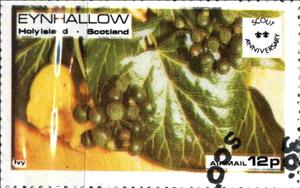Stamp: Ivy (Cinderellas 1974)
Ivy (Cinderellas 1974)
30 January (Cinderellas ) within release Eynhallow Holy Island, Scotland goes into circulation Stamp Ivy face value 12 Scottish penny
| Stamp Ivy in catalogues | |
|---|---|
| Colnect codes: | Col:HI 1974-03/7 |
Stamp is square format.
Also in the issue Eynhallow Holy Island, Scotland:
- Mini Sheet - Fruits face value 60;
- Stamp - Black Bryony face value 1;
- Stamp - White Beams face value 2;
- Stamp - Crab apple face value 4;
- Stamp - Honeysuckis face value 5;
- Stamp - Blackberry face value 6;
- Stamp - Guelder Rosa face value 10;
- Stamp - Ivy face value 12;
- Stamp - Woody Nighshade face value 20;
- Souvenir Sheet - Blackthorn Sloe face value 50;
|
Data entry completed
50%
|
|
|---|---|
| Stamp Ivy in digits | |
| Country: | Cinderellas |
| Date: | 1974-01-30 |
| Print: | Offset lithography |
| Emission: | Cinderella |
| Format: | Stamp |
| Face Value: | 12 Scottish penny |
Stamp Ivy it reflects the thematic directions:
In botany, a fruit is the seed-bearing structure in flowering plants (also known as angiosperms) formed from the ovary after flowering. Fruits are the means by which angiosperms disseminate seeds. Edible fruits, in particular, have propagated with the movements of humans and animals in a symbiotic relationship as a means for seed dispersal and nutrition; in fact, humans and many animals have become dependent on fruits as a source of food. Accordingly, fruits account for a substantial fraction of the world's agricultural output, and some (such as the apple and the pomegranate) have acquired extensive cultural and symbolic meanings. In common language usage, "fruit" normally means the fleshy seed-associated structures of a plant that are sweet or sour, and edible in the raw state, such as apples, bananas, grapes, lemons, oranges, and strawberries. On the other hand, in botanical usage, "fruit" includes many structures that are not commonly called "fruits", such as bean pods, corn kernels, tomatoes, and wheat grains. The section of a fungus that produces spores is also called a fruiting body.

